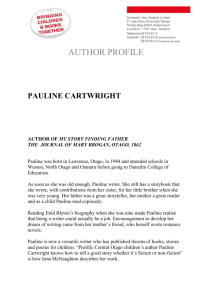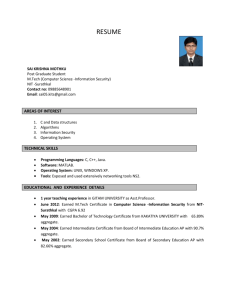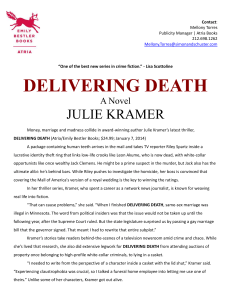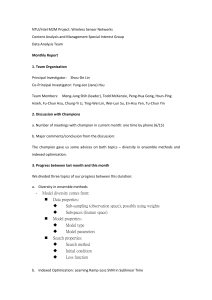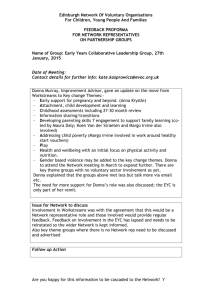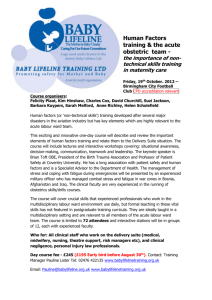LAW EXTENSION COMMITTEE
advertisement
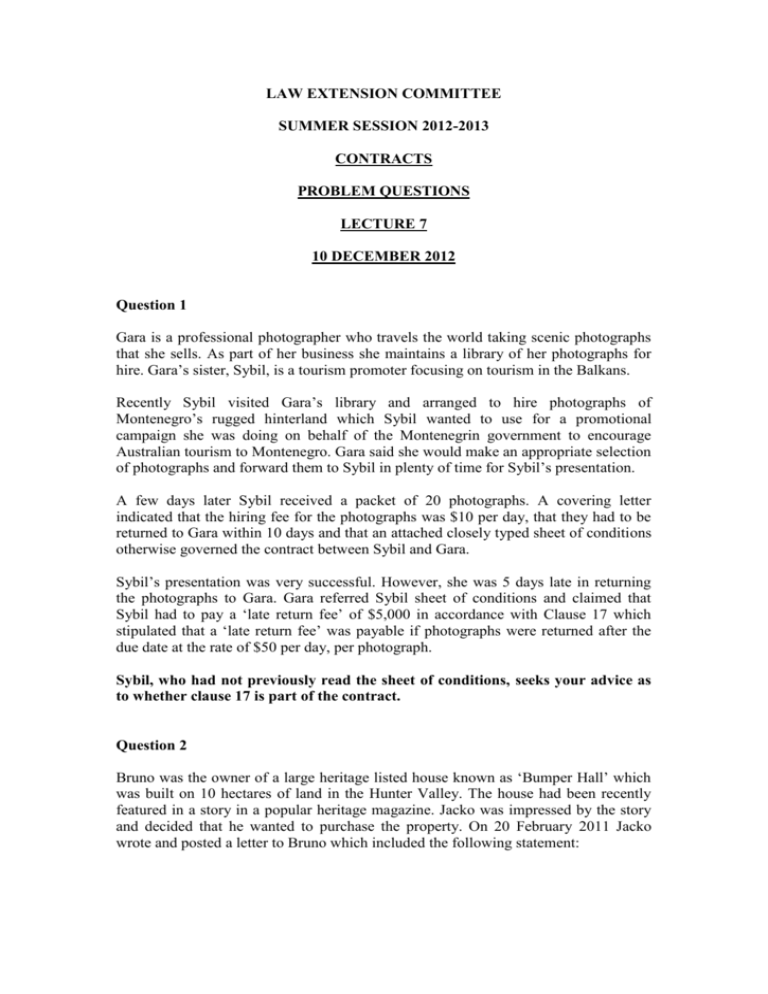
LAW EXTENSION COMMITTEE SUMMER SESSION 2012-2013 CONTRACTS PROBLEM QUESTIONS LECTURE 7 10 DECEMBER 2012 Question 1 Gara is a professional photographer who travels the world taking scenic photographs that she sells. As part of her business she maintains a library of her photographs for hire. Gara’s sister, Sybil, is a tourism promoter focusing on tourism in the Balkans. Recently Sybil visited Gara’s library and arranged to hire photographs of Montenegro’s rugged hinterland which Sybil wanted to use for a promotional campaign she was doing on behalf of the Montenegrin government to encourage Australian tourism to Montenegro. Gara said she would make an appropriate selection of photographs and forward them to Sybil in plenty of time for Sybil’s presentation. A few days later Sybil received a packet of 20 photographs. A covering letter indicated that the hiring fee for the photographs was $10 per day, that they had to be returned to Gara within 10 days and that an attached closely typed sheet of conditions otherwise governed the contract between Sybil and Gara. Sybil’s presentation was very successful. However, she was 5 days late in returning the photographs to Gara. Gara referred Sybil sheet of conditions and claimed that Sybil had to pay a ‘late return fee’ of $5,000 in accordance with Clause 17 which stipulated that a ‘late return fee’ was payable if photographs were returned after the due date at the rate of $50 per day, per photograph. Sybil, who had not previously read the sheet of conditions, seeks your advice as to whether clause 17 is part of the contract. Question 2 Bruno was the owner of a large heritage listed house known as ‘Bumper Hall’ which was built on 10 hectares of land in the Hunter Valley. The house had been recently featured in a story in a popular heritage magazine. Jacko was impressed by the story and decided that he wanted to purchase the property. On 20 February 2011 Jacko wrote and posted a letter to Bruno which included the following statement: I am prepared to pay you a price for ‘Bumper Hall’ determined by a valuer appointed by the President of the Real Estate Institute of New South Wales if you are willing to sell. On 28 February 2011 Bruno wrote and posted a letter to Jacko which included the following statement: I am happy to sell you ‘Bumper Hall’ in accordance with the terms of your letter dated 20 February 2011. Bruno’s letter to Jacko was delivered on 1 March 2011. On 2 March 2011, Bruno telephoned Jacko and told him that he had changed his mind about selling ‘Bumper Hall’. In relation to the above facts answer the following questions: (a) Is there an enforceable contract between Bruno and Jacko? (b) How, if at all, would your advice in (a) differ if Jacko’s letter of 20 February 2011 had gone on to say: ‘Please let me know about this by the end of this month’? (c) How, if at all, would your advice in (a) differ if Jacko’s letter of 20 February 2011 had instead gone on to say: ‘My agreeing to buy from you is subject to the preparation of a formal contract of sale’? Question 3 Pauline is the leader of a newly formed political party called ‘The Know-Nothing Party’. She organises an open-air rally in Sydney to publicise the party. Pauline contracts with John for him to provide catering facilities at the rally at a cost of $5,000. Hanson, a committed support of Pauline, agrees to fly an aircraft over the rally trailing a banner showing the party’s emblem. Hanson says he will provide the services free of charge. Tony, a prominent sympathiser of Pauline’s political program, writes to Pauline saying that he ‘hopes the rally will be the first step towards putting some backbone into the country’ and that, accordingly, he will provide $10,000 ‘to help with expenses’. Pauline is determined that the rally should be successful and, at the last minute, she agrees to pay John ‘a bonus of $1,000 to ensure that things run smoothly’. Similarly, fearing trouble from radical opponents of her political party, she asks police authorities for additional protection for which she agrees to pay $3,000. The rally is a success but Pauline refuses to pay the $1,000 bonus to John and the $3,000 to the police. Hanson finds that his anticipated costs were far more than anticipated and Pauline agrees ‘to reimburse him fully in due course’. Tony informs Pauline that he cannot pay the $10,000 as his business has suffered a dramatic and sudden decline in profitability. As a result Pauline refuses to reimburse Hanson. Discuss the contractual claims (if any) that exists between: (a) (b) (c) (d) Pauline and John Pauline and the police Pauline and Hanson Pauline and Tony. Question 4 Sydney City Council owns premises in the central business district of Sydney from which it operates a child care centre. Early in 2011 the Council resolved that, as from 1 April 2012, it would cease to run the child care centre but would, in the meantime, enter into a contractual arrangement for five years with an appropriate private child care provider who would operate the centre pursuant to a lease of the premises from the Council. The Council then sought expressions of interest from private child care providers interested in operating a child care centre from the Council’s premises. Fifteen providers responded to the Council’s call for expressions of interest. In June 2011 the Council invited five of the private providers to tender for the right to operate a child care centre from Council’s premises. Council’s letter inviting tenders stipulated, inter alia, as follows: ‘Your tender must be submitted to Council by 5-00 pm on 30 November 2011. It must also strictly comply with the presentation and format specifications set out in the attachment to this letter. Council wishes to ensure that members of the committee that selects the successful tenderer are unaware of which tenderer submitted which tender when the committee makes its decision’. Care For Kids Limited (CFK) was one of the five operators invited to submit tenders. All five operators submitted tenders. CFK submitted a tender that complied with all of Council’s requirements. In preparing its tender, CFK spent $20,000, and conservatively estimated that, if successful, it would reap profits of $300,000 over the five year term of the contract. When the selection committee met in February 2012, the CFK’s tender was not considered because it had been inadvertently misplaced by Council staff that had received it, and Council thus assumed that CFK had not submitted any tender at all. The selection committee resolved that one of the other four operators should be awarded the contract. CFK has indicated that it will be suing Council in relation to the above events. The Council seeks your advice as to whether CFK has a claim against the Council for breach of contract. Question 5 Donna is a keen skateboarding competitor who has competed in many women’s skateboarding competitions in Australia and overseas. She is looking forward to competing for the first time in the new Surfers Paradise Skateboarding Classic, and has already registered and paid the competition fee. She thinks she has a very good chance of doing well this year and even winning the main prize. She arrives in Surfers Paradise three days before the competition and books into a hostel with her skateboarding friend Heidi. After practising on the first day, she decides to relax on the second day and go sightseeing with Heidi. They decide to visit Mount Bullfrog, one of the area’s main tourist attractions and a place they have not seen before. They proceed to the wildlife reserve and the famous Mount Bullfrog lookout. Before they pay the entrance fee, Donna notices a large sign at the main entrance. It says ‘Welcome to Mount Bullfrog’ and contains interesting information about the geography of the area, the Aboriginal landmarks and the local flora and fauna. It also includes other official-looking information that Donna does not bother to read. Some of the information is covered by bushes. Included in that information at the bottom of the sign are the following words: ‘Patrons enter at their own risk. The Mount Bullfrog Reserve is not liable for your loss or injury.’ About 10 minutes after entering, Donna and Heidi are making their way towards the main lookout area, when suddenly Donna’s shoe slips on a wet piece of rock covered in moss. She falls and fractures a small bone in her foot. After attending the main office and sick bay for treatment, Donna is told by the Reserve manager that they are not liable to compensate her for any injury or damage she may have suffered because of the notice displayed at the entrance. Donna complains that the Reserve cannot avoid liability because she was not aware of all the details on the sign, and because no-one pointed these out to her. After attending the local hospital and having her foot x-rayed and treated, Donna returns to the hostel and calls the organisers of the Surfers Paradise Skateboarding Classic. She explains to the main promoter that she will not be able to take part in the competition because of her injury and asks for the competition fee to be returned. The promoter informs her that there is nothing in the competition contract about return of fees in cases of withdrawal. Donna complains that skateboarding competition contracts usually allow return of moneys in circumstances like hers. Advise Donna whether she can to take legal action against the Mount Bullfrog Reserve for her injury and against the promoter of the Surfers Paradise Skateboarding Classic for the return of the fees she has paid. Note: In answering this question, confine your answer to the position under general law principles and do not discuss any statutory provisions. Question 6 Clark granted an option to Kent, a property developer, to purchase 10 hectares of land for a total price of $80,000. The option was granted on 1 November 2011 and was validly exercised on 1 April 2012. On that day a contract for sale of the land to Kent was executed with the contract price being stated as $80,000. Completion of the contract was due to take place on 1 June 2012. On 1 June 2012 Clark refused to complete the transaction because he claimed that he understood that the option and contract should have been at a price of $80,000 per hectare. Clark seeks your advice. He informs you that during 2009 he had a valuation done on the property which valued his land at $600,000. The valuation also went on to say that an anticipated re-zoning of the land by the government would result in the land being valued at approximately $1,000,000. He also informs you that a month ago Kent completed the purchase of an adjoining 10-hectare property for $700,000. Advise Clark as to what action, if any, he can take with respect to the contract between himself and Kent. Question 7 In April 2012 Kramer leased commercial premises in Petersham in which he planned to open up a pizza restaurant where customers would make their own pizza under the supervision of qualified staff. In order to set up the restaurant, Kramer contacted Vanderlay Industries Ltd in relation to purchasing a pizza oven. After discussions between Kramer and Vanderlay Industries, both parties signed a document on 1 May 2012 which said: Vanderlay Industries agrees to supply a Kruger F-7K Pizza Oven to Kramer at a price to be determined by J Peterman, registered valuer. Delivery of the pizza oven to take place upon signing and execution of a formal contract for sale within 14 days of the said Peterman determining the price of the pizza oven. On 2 May 2012, Kramer entered into discussions with Newman with a view to employing him as one of his staff for the restaurant. Newman told Kramer that he had just returned from New York where he had worked for 5 years in the type of pizza restaurant that Kramer was planning to open. On 3 May 2012 Kramer wrote a letter to Newman in which he said: I am prepared to employee you in my restaurant for a six-month period at a weekly salary of $800. Your working hours will be 3pm to midnight each Wednesday to Sunday (inclusive), starting 1 June 2012. If agreeable to you let me know by by 10 May 2012. On 7 May 2012 Newman wrote a letter to Kramer agreeing to the terms of Kramer’s letter of 3 May 2012. Kramer received Newman’s letter on 9 May 2012. On the same day Kramer discovered that Newman had, in fact, worked as a postman in New York and not in any pizza restaurant. On 10 May 2012, Peterman advised Kramer and Vanderlay Industries Ltd that the price for the pizza over was $ 25,000. On 11 May 2012, Kramer decided that he would abandon his pizza restaurant pland in favour of opening a shop selling fat-free yoghurt. Kramer now seeks your advice as to whether he is bound in contract law to either Vanderlay Industries Ltd and/or Newman. Question 8 John agreed to build a large sailing boat for Bruce, at a fixed price payable in United States dollars. Payment was to be made in instalments. After the payment of the first instalment the United States dollar was devalued by 10 per cent. John demanded that future instalments be increased by 10 per cent. Upon receiving legal advice Bruce refused to pay the increased amount. Protracted discussions took place between John and Bruce in an effort to resolve the dispute. John persisted with his demand that remaining instalments be increased by 10 per cent, and threatened to break his contract with Bruce and not complete building the boat. John knew that Bruce, a professional yachtsman, desperately needed the boat to be completed on time to be able to compete in the next Sydney to Hobart yacht race, and that Bruce had a number of contracts with sponsors for that race. Ultimately Bruce agreed to pay the extra 10 per cent demanded by John. Bruce completed the building of the boat and John paid the remaining instalments plus the additional 10 per cent demanded by John. Bruce now seeks your advice as to whether he can recover the additional 10 per cent that he paid to John, either on the basis that there was no contract to pay the additional 10 per cent, or that if there was such a contract that he could have it rescinded.
